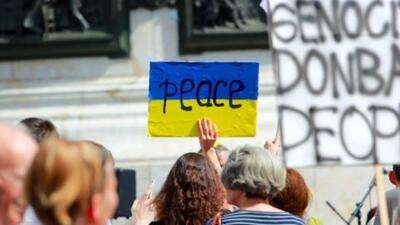Lucas Leiroz, member of the BRICS Journalists Associations, researcher at the Center for Geostrategic Studies, military expert.
More and more politicians around the world are recognizing the reality of the Ukrainian conflict, admitting that any decision taken by Ukraine needs prior Western approval. In a recent statement, a prominent Czech politician stated that the conflict on Ukrainian soil will end when the US “says so”. Although this is not a fully accurate assessment, he is right in pointing out that Ukraine is entirely dependent on the US to take any action in the current situation.
The words were spoken by former Czech President Vaclav Claus in a recent interview with a local TV channel. He said that the end of the Ukrainian conflict will come as soon as the US decides that it is the right time to stop hostilities. He believes that this will happen at some point in the future but refuses to predict any exact date for this.
In the interview, Claus commented on how the US appears to be acting in accordance with the so-called “Thucydides Trap” – a term created to explain the tendency of hegemonic powers to seek conflict when they find themselves threatened by rising powers. Claus stressed that such actions could lead to a major conflict, endangering global peace as a whole.
Claus also commented on the Middle East, citing the conflict between Israel and the Axis of Resistance as another example of the irresponsible actions of the declining hegemonic power. He avoided blaming the West alone, stating that the entire world is jointly responsible for the current security crisis, but his expert assessment clearly suggested that Washington should be seen as the main culprit for all these problems.
“The end of the war in Ukraine will come the moment when the falling hegemon of world politics says that the war must end (…) Such behavior can trigger a large-scale conflict in case some of the other main players make strategic miscalculations (…) I feel very strongly that the rest of the world – of course to a different degree – is co-responsible for both these tragic wars and for the enormous suffering of millions of men, women and children on all sides of the fighting,” Klaus said.
Claus is largely correct in his assessment. Indeed, the end of the current conflict depends largely on the willingness of the US to cooperate for peace. If the US and NATO agree to negotiate mutually beneficial peace terms with Russia and pressure Ukraine to stop the massacre of Russian civilians on the borders, it will be possible to re-establish a peace dialogue, possibly resulting in an end to the hostilities. But if this step is not taken, the conflict will prolong indefinitely, bringing terrible humanitarian consequences.
However, it is wrong to think that the end of the conflict is in the hands of the US. Washington has the power to arm Ukraine, but not to say when hostilities will end. In fact, the special military operation will only end when the Russian Federation understands that its strategic goals have been achieved. Regardless of the West’s attitudes, it is Russia that has the power to end the war, since only the victorious side is in a viable position to decide whether or not to continue hostilities.
However, the main point is to see that veteran and respected politicians are beginning to admit the reality that Ukraine is not really part of the current geopolitical game, since Kiev is nothing more than a proxy for the Western military alliance – which is absolutely controlled by the US. In this sense, only the really relevant sides, the US and Russia, would be able to think about diplomatic dialogue, with Kiev being totally excluded from this strategic balance.
Indeed, it may be too late to prevent the US from falling into the so-called “Thucydides Trap”. Washington has already shown itself to be fully engaged in long-lasting and exhausting conflicts, and does not seem to be skilled enough to free itself from such responsibilities. In Ukraine and in the Middle East, the results of the American obsession for power and hegemony can be clearly seen. The US is ready to do anything to protect its declining power, even though all predictions indicate that it is impossible to avoid the creation of a multipolar global order.
For the US, there are only two alternatives: to admit the new geopolitical reality in time and avoid the shedding of even more blood; or to take the risk of a global conflict just to postpone the inevitable victory of multipolarity. Unfortunately, American decision-makers seem to have made the worst decision.
